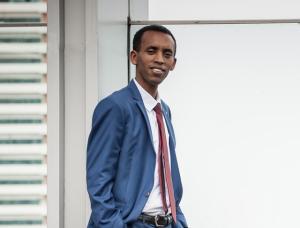A multi-drug resistant TB survivor in Ethiopia shares his story
“Life is a long, often surprising road, with many hurdles to overcome and many opportunities to take advantage of. Back in 2003, I was in the land of opportunity - studying at university to become a pharmacist and dreaming of getting a good job. But after I finished my first year, the symptoms came,” says Endalkachew Fekadu, a multi-drug resistant TB survivor.
“I was struggling with a loss of appetite, fever, weakness and night sweats, so I went to the university campus clinic. A sputum test confirmed that I had TB. I wasn’t too worried as it was quite common on the campus and I thought that I would make a full recovery if I took the medication,” he continues.
“I wasn’t getting any better, but didn’t want to delay my dream of finishing education. It however became clear that I was in a life threatening condition and so I went home. After returning home for some time, I went back to Addis with my family and had another sputum test. It was a shocking result for me. I had multi-drug resistant TB, a much more lethal type of TB that is more difficult and expensive to treat,” Endalkachew says.
Multi-drug resistant, or MDR-TB, is on the rise in the developing world. In 2014, WHO estimated that between 32 000 to 49 000 MDR-TB patients live in the African Region. In Ethiopia, about 40 health centres do have the capacity to diagnose and treat MDR-TB.
“Diagnosis didn’t lead to immediate treatment. The MDR-TB treatment I desperately needed was only available outside Ethiopia, and it was too expensive. My family and friends made contributions but it wasn’t enough.
Everybody was waiting for my death, until a guardian angel appeared. Mr. Mike Hinckfoot from Compassion International offered to bring the drugs from the USA. They were difficult to import and weren’t even registered with drug administration and control authority. But after many ups and downs I got the medicine,” tells Endalkachew.
“But with thanks to God I finished the medication on 6 June 2007. I was certified cured and I am perfectly OK now! I feel like I’ve been given a second chance. In October of that year I went back to school and graduated from the Addis Ababa University School of Pharmacy. I wrote my thesis on counterfeit drugs and their impact on drug resistance and global health”, says Endalkachew.
Ethiopia remains one of the 30 high burden countries, including 16 African countries, and TB remains one of the leading causes of death in the country. According to WHO estimates, in 2014, twenty out 10 000 Ethiopians have been infected with TB, and almost 4 out of 20 people living with the disease die[1].
Today, Endalkachew has been able to engage in a lot of activities. He is the founder and chief executive of Volunteer Health Services and the Ethiopian Drug Information Network, the Chief Editor and Owner of Pharmanet media and communication Company. “That’s not all and I have ambitions to do more,” he says. “I have established a centre for monitoring the adverse effects of drugs. I would like to actively engage in politics. Someday I would like to be a minister.”




